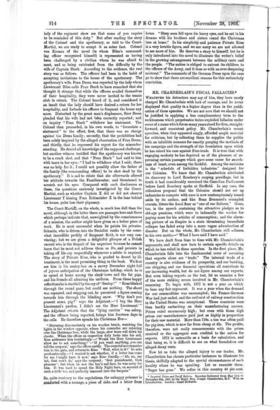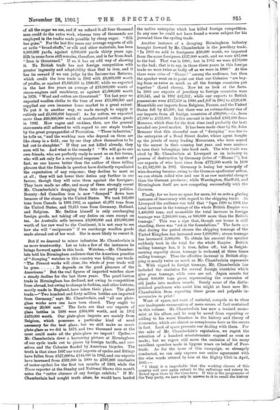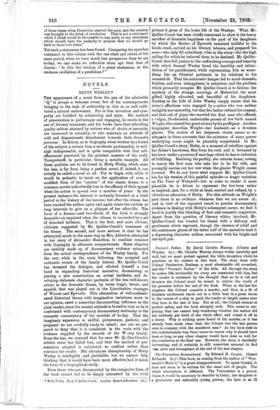MR. CHAMBERLAIN'S FISCAL FALLACIES.* WHATEVER his detractors may say of
him, they have rarely charged Mr. Chamberlain with lack of courage, and he never displayed that quality in a higher degree than in the publi- cation of these speeches. We are not sure that we should not be justified in applying a less complimentary term to the recklessness which perpetuates thrice-exploded fallacies under cover of a name which for so many years stood for firm, straight- forward, and consistent policy. Mr. Chamberlain's recent speeches, when they appeared singly, afforded ample material for criticism, but by collecting them he supplies the public with an infallible measure for exactly gauging the methods of his campaign and the strength of the foundation upon which he has raised his case against Free-trade. It is true that with engaging modesty he has deprived us of the pleasure of re- perusing certain passages which gave some cause for search- ings of heart, even among the faithful Among the excisions is the "schedule of forbidden industries" designed for our Colonies. We know that Mr. Chamberlain attributed its discovery to Lord Rosebery's carping persiflage, but in truth it had considerably exercised the Canadian Parliament before Lord Rosebery spoke at Sheffield. In any case, the ridiculous proposal that the Colonies should not set up industries to compete with ours is now contemptuously tossed aside by its author, and like Beau Brummel's crumpled cravats, litters the fiscal floor as "one of our failures." Gone, too, is the speech containing the attractive pledges as to old-age pensions, which were to indemnify the worker for paying more for his articles of consumption; and the alarm- ing picture of an Empire in a state threatening immediate collapse has faded away into a more vague adumbration of disaster. But on the whole, Mr. Chamberlain still adheres to his own motto,—" What I have said I have said."
We have dealt from time to time with Mr. Chamberlain's arguments, and shall now turn to certain specific details on which he has relied in these speeches. In the first place, Mr. Chamberlain falls into the fundamental error of assuming that exports alone are "trade." The internal trade of a country is also evidence of its prosperity, and our banking, our shipping, and our financial operations all contribute to our increasing wealth, but do not figure among our exports. But even taking exports as the test, let us examine a few of the more striking errors involved in Mr. Chamberlain's reasoning. To begin with, 1872 is not a year on which to base any fair argument. It was a year when the demand for our commodities was unexampled; the Franco-German War had just ended, and the outburst of railway construction in the United States was exceptional. Those countries were ' then hardly embarking on their manufacturing careers. Prices ruled enormously high ; but even with those high prices our manufacturers paid just as highly in proportion for their raw material More than 110s. a ton was often paid for pig-iron, which is now far from cheap at 42s. The profits, therefore, were not really commensurate with the prices received or the aggregate sum credited to the nation for exports. 1872 is untenable as a basis for calculation, and that being so, it is difficult to see on what foundation our alleged decay rests.
Now let us take the alleged injury to our trades. Mr. Chamberlain has chosen particular instances to illustrate his thesis, skilfully adapted to the special circumstances of each locality where he was speaking. Let us examinb them. "Sugar has gone." We refine in this country 40 per cent.
,...,lemperria4loy.nion and Tariff Reform. Speeches Delivered from May 15th to Hon. Joseph Chamberlain, M.P. With aiL fuotroductrion. Londottlaeranilettehards.-
of all the sugar we nee, and if we refined it all four thousand men could do the extra work, whereas tens of thousands are employed, in the trades made possible by cheap sugar. "Silk has gone." For the last five years our average exports of silk -or satin broad-stuffs," .or silk and Other materials, has been 9,500,000 yards, against 4,000,000 yards thirty years ago. silk in some form still remains, therefore, and is far from dead. Iron is threatened." If so, it has an odd way of showing it. No British trade has met foreign competition with greater ingenuity and adaptability than that in iron, and it has its reward if we can judge by the Income-tax Returns, which credit the iron trade in 1902 with 26,660,000 worth -of profits, as against 21,840,350 in 1896-97, while we exported in the last five years an average of 218,000,000 worth of steam-engines and machinery, as against 25,000,000 worth in 1870. "Wool and cotton are threatened." Yet last year we -exported woollen cloths to the tune of over 215,000,000 and supplied our own immense home market to a great extent. To put it in another way, we made enough to supply it entirely and 25,000,000 beyond! As for cotton, we exported more than 260,000,000 worth of manufactured cotton goods in 1902. How vague and reckless, then, are the general statements still adhered to with regard to our staple trades by the great propagandist of Protection. "These industries," he tells us, "and the working men who depend on them are like sheep in a field; one by one they allow themselves to be led out to slaughter." If they are not killed already, they soon will be. And what is the remedy ? "We will go to our own friends, who are perfectly ready to meet us on fair terms, who will ask only for k reciprocal response." As a matter of fact, no one knows better than the author of these telling phrases that the friends in questioii have distinctly repudiated the expectation of any response; they decline to meet us at all ; they will not lower their duties any further in our favour, though they will raise them against the foreigner. They have made no offer, and many of them strongly resent Mr. Chamberlain's dragging them into our party politics. Bounty - fed Canadian iron is now " dumped " down here because of the slump in the United States. We took 103,000 tons from Canada in 1901-1902, as against 45,973 tons from the United States, and 78,615 tons from Germany, Holland, and Belgium. Mr. Seddon himself is only surcharging foreign goods, not taking off any duties on ours except on tea. As Australia sells between 28,000,000 and 210,000,000 worth of her raw wool to the Continent, it is not easy to see how she will " reciprocate " if we surcharge woollen goods made abroad out of her wool. She is more likely to resent it.
But if we descend to minor industries Mr. Chamberlain is no more trustworthy. Let us take a few of the instances he brings forward again in this book. Watches.—Mr. Chamber- lain told his Birmingham audience that the American practice of " dumping " watches in this country was killing our trade. "The Prescot works will close, the whole of your trade will be gone It depends on the good pleasure of the Americans." But the real figures of imported watches show -a steady decline for the last three years. The pearl-button trade in Birmingham has declined, not owing to competition from abroad, but owing to change in fashion, and other buttons, mostly made in England, have taken their place. The glass trade.—" Two hundred and forty million bottles are imported from Germany," says Mr. Chamberlain, and "all our plate- glass works save one have been closed. They ought to employ 20,000 men." The facts are that our exports of glase bottles in 1898 were 2364,000 worth, and in 1902 2470,000 worth. Our plate-glass imports are mainly from Belgium, which possesses a particular kind of sand neoessary for the best glass ; but we still make as much plate-glass as we did in 1878, and two thousand men at the most could make all -the plate-glass we import ! Cycles.— Mr. Chamberlain drew a harrowing picture at Birmingham of our cycle trade cut to pieces by foreign tariffs, and our- selves and the Colonies flooded by American bicycles. The truth is that since 1897 our total imports of cycles and fittings have fallen from 2527,000 to 2144,000 in 1902,-and our exports have increased from 2531,000 in 1900 to 2707,000 (exclusive of motor-cycles) for the first ten months of 1903, while the Times reporter at the Stanley and National Shows this month notes the "entire absence of any foreign exhibits." If Mr. Chamberlain had sought truth alone, he would have lauded the native enterprise which has killed foreign competition. In any case he could not have found a worse subject for his jeremiad than the cycling trade.
Another instance of a decaying Birmingham industry. brought forward by Mr. Chamberlain is the jewellery trade. "In 1900 we sold to foreigners 250,000 worth, we imported
from the same foreigners £137,000 worth, and we were 287,000 to the bad. That was in 1900; but in 1902 we were 2170,000 to the bad; that is to say, in those three years in this foreign trade we were twice as badly off as we were in 1900." At this there were cries of " Shame! " among the audience, but then the speaker went on to point out that our Colonies "are buy- ing from us twice as much as all the foreign countries put together" (Loud cheers). Now let us look at the facts. In 1900 our exports of jewellery to foreign countries were 250,545, and in 1902 £62,382; while our exports to British possessions were 2127,659 in 1900, and fell in 1902 to 2120,441
Meanwhile our imports from Belgium, France, and the United ' States fell by £5,309; but there was an extraordinary rise of our imports from all foreign countries of 296,000,—i.e., front
27,000 to 2113,000. In this amount is included 2101,000 from Morocco, which thus for the first time (and probably the last) invaded our jewel market. It has been made clear by Sir John Brunner that this shameful case of " dumping " was due to the enterprise of a Bond Street dealer, whose agent bought up the jewels of many leading Moroccans, who were scared by the unrest in their country last year, and were anxious to turn their belongings into hard cash. The wire trade was cited by Mr. Chamberlain at Liverpool as an industry in
process of destruction by Germany (cries of "Shame !"), but our exports of wire have*risen from 2772,000 worth in 1898
to 21,042,000 in 1902. Germany is losing her monopoly of ' wire-drawing because, owing to the German syndicates' tuition. we can obtain rolled wire and use it as raw material cheapor than the German producer ; while Warrington, Sheffield, and Birmingham itself are now competing successfully with the German. .
Finally, for we have no space for more, let us note-a glaring instance of inaccuracy with regard to the shipping trade. At
Liverpool the audience was told that " frpm 1890 to 1901 the total increase in the tonnage of the whole British Empire was
1,400,000 tons, and meanwhile the total increase in foreign tonnage was 2,200,000 tons, or 800,000 more than the British tonnage." This was a sign that, though our house is still standing, there was "rot in the foundations." The facts are that during the period chosen the shipping tonnage of the United Kingdom has increased over 1,600,000; steam tonnage has increased 3,000,000. To obtain his amount the speaker
suddenly took in the total for the whole Empire. British sailing tonnage has, it is true, fallen off; but in freight- earning capacity steam tonnage is reckoned at three times sailing tonnage. Thus the effective inerenees in British ship-
ping is nearly twice as much as Mr. Chamherlain represents it. With regard to foreign tonnage, Mt. Chamberlain has included the statistics for several foreign countries *hich give gross tonnage, while ours are mi. Japan counts for about 800,000 tons gross, representing the conversion of old junks into modern vessels. Surely some of the distin- guished gentlemen who assist him might at least save Mr.
Chamberlain from repeating these gross and palpable in- accuracies in print !
Want of space, not want of material, compels us to close our inadequate enumeration of mere errors of fact contained in this volume. Mr. Chamberlain has now a trained econo- mist at his elbow, and he may be saved from repeating or adding to his worst blunders in the history and theory of economics, which are almost as conspicuous here as the errors in fact. Lack of space prevents our dealing with them. For the sake of Mr. Chamberlain's rep'utatipn, we regret the retention of a hundred misstatements exposed as soon as made ; but we regret still more the omission of his many excellent speeches made in bygone year's on behalf of Free. trade. As for the issue of this campaign, so strangely conducted, we can only express our entire agreement with. the wise words uttered by him at the Eighty Club in April, 1885:—
"I think it is improbable that the working classes of this country will ever again submit to the sufferings and misery in- flicted upon them by the Corn-laws. If this is the programme of the Tory party, we have only in answer to it to recall the history of those times when Protection starved the poor, and the country was brought to the brink of revolution. That is not a retrospect which I think would be favourable to any party or any statesman which should have the audacity to propose that we should go back to those evil times."
Yet such a statesman has been found. Comparing the speeches contained in this volume with the one cited and others of the same period, when we were much less prosperous than we are to-day, we can make no reflection more apt than that of Junius : "Is this the wisdom of a great statesman, or the ominous oscillation of a pendulum ? "




















































 Previous page
Previous page